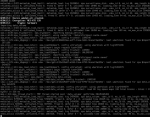I am looking to move off truenas to rockstor because not being able to get a backup on usb to put in the firesafe just leaves me too uncomfortable.
Not to mention my lack of experience with ZFS the strange import messages i receive on boot since moving to v12.
is it possible to mount BTRFS drive to be able to transfer the data. I don't have a 2nd system i can use.
Not to mention my lack of experience with ZFS the strange import messages i receive on boot since moving to v12.
is it possible to mount BTRFS drive to be able to transfer the data. I don't have a 2nd system i can use.
Last edited:

